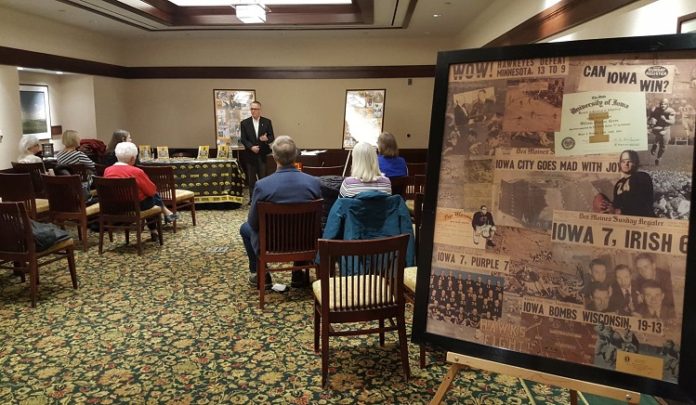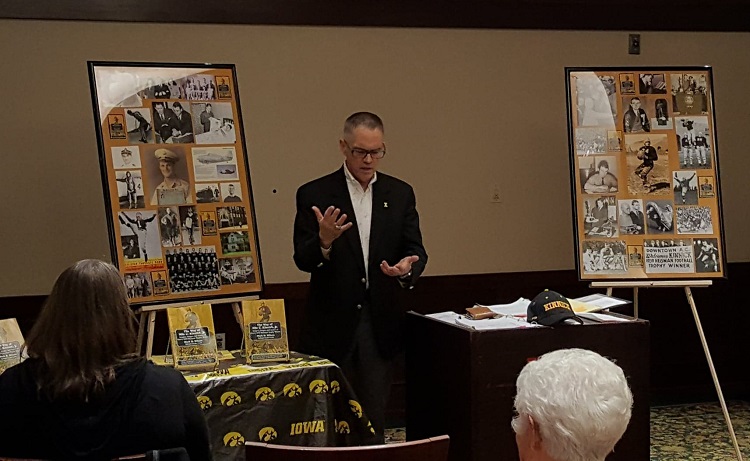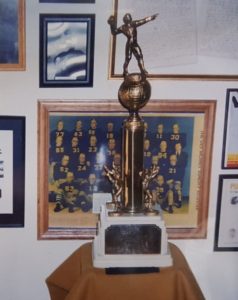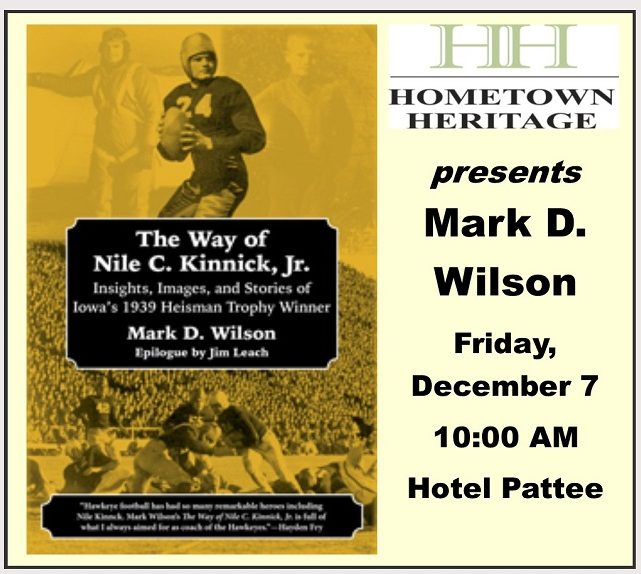

In a wide-ranging lecture Friday morning at the Hotel Pattee, author Mark D. Wilson described his long journey to writing a book on the insights and inspirations of Iowa football great Nile Clarke Kinnick Jr.
“In our lifetimes,” Wilson said, “many of us have had or still have an individual we look up to, someone who inspires us, challenges us, helps us face adversities or helps us form a positive outlook on life. Nile Clarke Kinnick Jr. is that person for me, and his way of thinking inspired me to write ths book, ‘The Way of Nile C. Kinnick Jr.: Images, Insights and Stories of Iowa’s 1939 Heisman Trophy Winner.'”
Wilson told the audience of about a dozen that he retired in 2002 after 30 years of teaching in the Iowa City school system. He said he first heard the name of Nile Kinnick as a child growing up in Iowa City in the 1950s, but Kinnick’s was just another name in the pantheon of University of Iowa football, standing alongside Duke Slater, Aubrey Devine, Cal Jones, Alex Karras, Forest Evashevski, Ed Podolak and many others.
Wilson said he was also aware when the Iowa Stadium was renamed the Kinnick Stadium in 1972, the same year he was discharged from service in the U.S. mlitary. But it was not until Wilson was invited in 2003 to become a volunteer ambassador for the University of Iowa Athletics Hall of Fame and Museum that his relation to Kinnick began in earnest.
 “The Way of Nile C. Kinnick” is divided into four chapters: Fascination, Admiration, Inspiration and Dedication, and these were the stages of Wilson’s own relation to Kinnick he said. When Steve Semken of Ice Cube Press, which published the book, encouraged Wilson to bring his own personality into the manuscript, including his battle with Waldenström’s macroglobulinemia, a rare form of blood cancer, the book found its unifying theme.
“The Way of Nile C. Kinnick” is divided into four chapters: Fascination, Admiration, Inspiration and Dedication, and these were the stages of Wilson’s own relation to Kinnick he said. When Steve Semken of Ice Cube Press, which published the book, encouraged Wilson to bring his own personality into the manuscript, including his battle with Waldenström’s macroglobulinemia, a rare form of blood cancer, the book found its unifying theme.
Friday’s hour-long discussion moved easily from Wilson’s personal anecdotes to stunning statistics to quotations from Kinnick. He naturally dwelled on the 1939 Iowa Hawkeye football team, nicknamed the Iron Men, and their legendary campaign that included defeating number-three-rated Notre Dame. Kinnick kicked an astonishing 16 punts in that famous game, totaling 738 yards.
At the end of that winning season, Kinnick won the prestigious Heisman Trophy, and he swept the other major athletics awards, including the Walter Camp Memorial Trophy, Maxwell Award and Associated Press Male Athlete of the Year. He was unanimously chosen as a First-Team All-American.

More than 70 years later, it was Wilson who took on the painstaking task of repairing and restoring Kinnick’s Walter Camp Memorial Trophy after it was accidentally rediscovered among half-forgotten boxes and other lumber in the basement of the Carver Hawkeye Arena.
Wilson said Kinnick was perfectly placed for a career in politics. He was the grandson of George Washington Clarke of Adel, who served as Iowa’s 21 governor from 1913 to 1917 and alongside his family connections, Kinnick’s Heisman fame allowed him to make a series of virtual campaign speeches around the country.
A hint of what the future might have held was glimpsed in a speech Kinnick delivered before the Young Republicans in introducing Wendell Wilkie, the Indiana businessman who unsuccessfully challenged U.S. President Franklin D. Roosevelt in 1940. An excerpt from Kinnick’s Heisman acceptance speech is played before the national anthem at every home football game.
Kinnick told the Young Republicans, “When the members of any nation have come to regard their country as nothing more than the plot of ground on which they reside and their government as a mere organization for providing police or contracting treaties, when they have ceased to entertain any warmer feelings for one another than those which interest or personal friendship or a mere general philanthropy may produce, the moral dissolution of that nation is at hand.”
Sadly, Kinnick’s own physical dissolution was even nearer at hand. His studies at the University of Iowa College of Law were interrupted by his fateful enlistment into the U.S. Naval Air Reserve only three days before the Japanese bombing of the U.S. Navy’s Pacific Fleet at Pearl Harbor, Hawaii, Dec. 7, 1941.
“People must come before profits,” Kinnick said in his final speech. Wilson said the words befit an Iowan whose athletci prowess was only exceeded by his compassion and “spiritual fitness.”
“The Way of Nile C. Kinnick Jr.: Images, Insights and Stories of Iowa’s 1939 Heisman Trophy Winner” is available online and at Beaverdale Books in Des Moines. Wilson’s Perry visit was sponsored by Hometown Heritage.

















